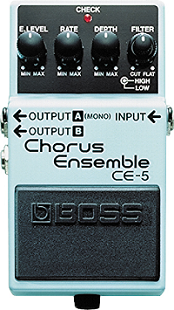Difference between revisions of "CE-5"
m |
m |
||
| Line 4: | Line 4: | ||
[[Boss]] CE-5 Chorus Ensemble Pedal. One of the effects that Boss started their line of pedals with was the [http://www.effectsdatabase.com/model/boss/ce1 CE-1 Chorus Ensemble]. This is the old 1970s grey "bean" shaped pedal with two button switches on it. This effect still gets rave reviews on lush subtlety of the chorus effect. Boss then went with the "CE" designation for the "CE-2 Chorus" which was a simpler mono-based effect and then released the "CE-3 Chorus" with the distinctive black knobs with red line indicators (like the Boss VB-2) and true stereo outputs. Boss then changed direction and chorus designation and released the "CH-1 Super Chorus". | [[Boss]] CE-5 Chorus Ensemble Pedal. One of the effects that Boss started their line of pedals with was the [http://www.effectsdatabase.com/model/boss/ce1 CE-1 Chorus Ensemble]. This is the old 1970s grey "bean" shaped pedal with two button switches on it. This effect still gets rave reviews on lush subtlety of the chorus effect. Boss then went with the "CE" designation for the "CE-2 Chorus" which was a simpler mono-based effect and then released the "CE-3 Chorus" with the distinctive black knobs with red line indicators (like the Boss VB-2) and true stereo outputs. Boss then changed direction and chorus designation and released the "CH-1 Super Chorus". | ||
| − | "CE" then reappeared with the "CE-5 Chorus Ensemble". The | + | "CE" then reappeared with the "CE-5 Chorus Ensemble". The earlier CE-5 models share the same pedigree (and MN3007 bucket-brigade delay chip) as the CE-2 and CE-3 and are valued for such. Later models of the CE-5 (labeled CE-5a on the PCB) discard the older analog design and use a new digital architecture. Panasonic stopped producing the MN3007 chip, causing Boss to change to the new digital architecture. |
| + | |||
| + | Thermionic Studios owns a CE-5 that is the older, appreciated, analog version. Opinions of the CE-5 (digital version) tend not to be positive. | ||
==Controls== | ==Controls== | ||
| Line 19: | Line 21: | ||
==General Information== | ==General Information== | ||
| + | [http://www.diystompboxes.com/smfforum/index.php?topic=179.0] | ||
| + | |||
| + | <blockquote> | ||
| + | <div style="background-color:#222222; border:2px solid #e69710; padding:10px; {{border-radius|8px}}"> | ||
| + | "Change C22 from 5pF to 22pF (or just solder a 22 pF across C22 on the back of the board). Increasing C22 increases the amount of delay through the bucket-brigade IC (analog delay). Increasing C22 to 22pF has a dramatic and wonderful effect on the depth of the chorus effect." | ||
| + | </div> | ||
| + | </blockquote> | ||
==Phase Inversion== | ==Phase Inversion== | ||
Revision as of 17:58, 19 February 2018
Boss CE-5 Chorus Ensemble Pedal. One of the effects that Boss started their line of pedals with was the CE-1 Chorus Ensemble. This is the old 1970s grey "bean" shaped pedal with two button switches on it. This effect still gets rave reviews on lush subtlety of the chorus effect. Boss then went with the "CE" designation for the "CE-2 Chorus" which was a simpler mono-based effect and then released the "CE-3 Chorus" with the distinctive black knobs with red line indicators (like the Boss VB-2) and true stereo outputs. Boss then changed direction and chorus designation and released the "CH-1 Super Chorus".
"CE" then reappeared with the "CE-5 Chorus Ensemble". The earlier CE-5 models share the same pedigree (and MN3007 bucket-brigade delay chip) as the CE-2 and CE-3 and are valued for such. Later models of the CE-5 (labeled CE-5a on the PCB) discard the older analog design and use a new digital architecture. Panasonic stopped producing the MN3007 chip, causing Boss to change to the new digital architecture.
Thermionic Studios owns a CE-5 that is the older, appreciated, analog version. Opinions of the CE-5 (digital version) tend not to be positive.
Controls
- Knob 1 - "E. Level": (Effect Level) This knob increases the amount of effect (wet) signal as compared to the dry sign
- Knob 2 - "Rate": This knob sets the speed of the modulation of the chorus; clockwise increases the speed.
- Knob 3 - "Depth": This knob sets the depth of the sweep of the chorus; clockwise increased the depth of the sweep.
- Knob 4 - "Filter": This is a dual-knob with an inner- and outer- knob, actually representing two tone controls.
- Inner Knob - "High": sets the volume of the treble tones, clockwise is more treble.
- Outer Knob - "Low": sets the volume of the bass tones, clockwise is more bass.
- Footswitch - "On/Off": Switch toggles the pedal on and off
General Information
"Change C22 from 5pF to 22pF (or just solder a 22 pF across C22 on the back of the board). Increasing C22 increases the amount of delay through the bucket-brigade IC (analog delay). Increasing C22 to 22pF has a dramatic and wonderful effect on the depth of the chorus effect."
Phase Inversion
Pedal Manual
Schematic
- Additional Sources
